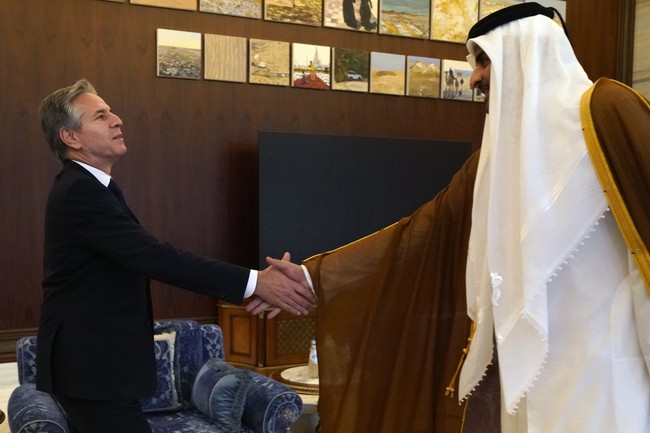
I have long been wondering about Qatar’s willingness to host Hamas’ leadership post-10/7.
As non-Western as Qatar is, the Emirate has been working assiduously to court Western approval and is hardly a radical Islamist state. This is not to suggest the regime is liberal or Liberal, but rather that they aren’t exactly Iranian-style fanatics. The state is pretty much what you would expect in a country that is in a dangerous region filled with radicals but with an elite who are Western-educated and resolutely capitalist.
I had long suspected that Western governments had given implicit approval for Qatar’s hosting of the radical Islamist terrorist group’s leaders in order to use it as a back-channel to Hamas.
Maybe the US thought the Qatar/Hamas relationship would yield the release of the hostages. But it’s been more than five months and 134 Israelis are still held in Gaza. It’s time for Qatar — and Turkey — to stop harboring Hamas’s top terrorists.https://t.co/yjYw9M5N9s
— Israel War Room (@IsraelWarRoom) March 14, 2024
Surprisingly, it turns out that I was right. Even a stopped clock and all that. My specialty is more in cultural analysis than political intrigue, despite or because of my background in Political Science.
WASHINGTON — Qatar’s Emir Tamim bin Hamad Al Thani proposed expeling Hamas’s leaders from Doha during a meeting with US Secretary of State Antony Blinken days after the terror group’s October 7 onslaught, two officials familiar with the matter told The Times of Israel on Wednesday.
The proposal was made in somewhat of a roundabout way during the emir’s opening remarks at an October 13 closed-door meeting in Doha with Blinken. Thani began by expressing his horror over Hamas’s attack in which some 1,200 people in Israel were slaughtered and another 253 were abducted into Gaza. He then asked whether it was time for the US to ask Qatar to expel the Hamas’s leaders, the two officials said, speaking on condition of anonymity.
That this story leaked is likely due to Qatar’s frustration with the enduring criticism it has suffered since 10/7. The country has been accused of coddling Hamas’ leaders–and no doubt it sure looks that way–and given the country’s obvious efforts to court Westerners, it surely rankled.
When Blinken began his own remarks, he didn’t respond directly to the emir’s proposal but did go on to say that he thought it would be better for Qatar to use its contacts with Hamas — through the office it allowed the terror group to establish in Doha in 2012 at Washington’s behest — to mediate between the Gaza war parties to secure a hostage deal, the officials recalled. They added that the US secretary of state also clarified that it would not be “business as usual” for Hamas in Qatar once the conflict concludes.
Qatar has come under increasing pressure for what critics in the Israeli government — along with some US Republicans — say has been its refusal to lean hard enough on Hamas to agree to a hostage deal with Israel, including by threatening to oust the terror group’s leadership in Doha; and the back-and-forth in October 13 meeting revealed a more complex picture.
This, to me, has the ring of truth. Qatar has been a strong ally of the United States–designated a Major Non-NATO ally–and heavily promotes itself as a modern country. Qatar Airlines is clearly designed to be as much an ambassador for the regime, and its investment in soccer is surely not solely a financial investment.
And, of course, Qatar hosts the US’ largest military presence in the region. While this no doubt gives them considerable leverage to resist US demands, it also indicates that Qatar desperately wants to be under the US security umbrella in a region filled with huge threats.
Qatar is a relatively neutral ground for the US to talk to adversaries who wouldn’t want to be seen as buckling to US pressure. It is where we have communicated with the Taliban and where the hostage negotiations have been taking place since 10/7.
Using neutral third parties to conduct conversations is a common tactic used by belligerent or hostile states. It is a common practice, as even countries at war often need to talk to one another for various reasons, and it can’t be done through ambassadors.
This is why I have refrained from criticizing Qatar–not that they would care in the least if I did. I suspected that they were actually cooperating with the US and perhaps Israel by making it possible to negotiate and that everybody saw having Hamas leaders in Qatar was better than some of the alternatives.
Much trickier for the US is Turkey’s Erdogan’s outright support for Hamas. As a NATO country increasingly hostile to Western values, Turkey is a huge diplomatic and security problem. Erdogan has been aligning himself with Russia while remaining part of the NATO alliance. It is a partner in the F-35 program and is working with Russia’s military at the same time.
It’s a quandary and far more troubling than Qatar’s implicit tolerance of Hamas’ leadership.
